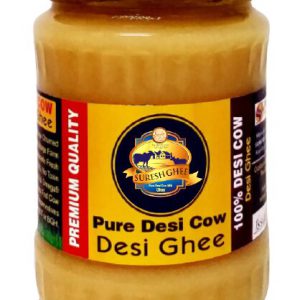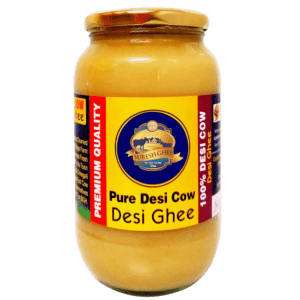Do you think ghee is bad for your health? Here are facts which will make you feel otherwise.
Ghee that was an essential part of Indian cuisine has lost its sheen these days. Many ‘health-conscious’ people dismiss adding ghee to food as they believe it is an unhealthy practice. But in reality, ghee is packed with myriad health benefits. Don’t believe it? Here’s how adding a dollop of ghee is good for your health.
However, by the changing time as fitness awareness is raising. Different fitness experts have different views when it comes to having FAT in our diet. However, most of them are now agree that GHEE obtained from milk fat is one of the best sources of FAT our body can consume and have benefited from it.
In fact, many Ayurvedic practitioners consider ghee to be such a supreme health tonic that it is often recommended, in small doses, as the first food given to a newborn child, even before breast milk ( refer ) in order to keep the digestion of the baby in order, seed the body with life force (or ojas) and supply deeply nourishing nutrients for building a healthy brain and nervous system.
But before we dive into that, let’s first get clear on exactly what ghee is: clarified butter. Clarified butter is essentially butter that has been lightly simmered on a stovetop, the process of which causes the milk fats, water, and other impurities to separate out to the top and bottom of the pan. These are then filtered out removing the lactose and leaving the highly purified, medicinal oil known as ghee, which solidifies at room temperature.

The Health Benefits of Ghee
While the term superfood is thrown around pretty loosely these days, ghee’s benefits truly live up to the hype—from the brain, to the digestive tract and beyond, this ancient nourishing fat truly rejuvenates the body from the inside out.
- Ghee Acts as brain tonic: According to nutritionist Neha Chandna, Ghee is good for the nerves and brain. It contains high levels of omega-6 fatty acids and omega-3 fatty acids, which is ideal for overall health. Apart from this, decreased intake of these acids is associated with increased risk of dementia and Alzheimer’s. Hence, make it a habit to include ghee in your diet regularly as it can help your brain function better.
- Aids digestion: Ghee helps in the secretion of stomach acids that aid digestion. Celebrity nutritionist Rujuta Diwekar in her series Indian Food Wisdom and the Art of Eating Right highlights the fact that certain foods such as khichdi, puran poli, etc. need to have ghee to help us digest them better. Hot milk with ghee at the time before going to bed help clearing our stomach in the morning.
- Used as a natural moisturiser: Ghee is a good beauty enhancer as well. If you have chapped lips, apply a drop of ghee on them before you sleep. In Ayurveda, ghee is used as a moisturising agent by mixing it with water and stirring it. The process is repeated several times before ghee can be used. And once made, you can store it for up to six months to use it regularly. It helps your skin to look young, healthy and plump.
- Melts stubborn fat: If you have problem areas where fat gets accumulated quickly, consider adding ghee to your diet. ‘Ghee has essential amino acids that help mobilise the fat and allow the fat cells to shrink in size,’ explains Rujuta. Apart from it, Ghee has CLA and butyric acid which help us getting slim figure and get weight loss.
- An Ayurvedic medicine: In Ayurveda, it has been mentioned that aged ghee is as good as a medicine with a few herbs magic. In Ayurvedic medicine, ghee is said to be tri-doshic in smaller doses, meaning that it restores balance and harmony and tends to calm (pacify) all body types (or constitutions).
For people of a skinny and medium build, ghee in small to medium doses is generally calming and relaxing both physically, emotionally and energetically. For those of a larger or heavier build, ghee is best taken in smaller quantities for maximum benefit, as it can calm an otherwise sluggish metabolism too much.
For this reason, ghee can be taken at night just before bed to help drift off into a pleasantly deep sleep. It is also great in combination with more stimulating, hot and spicy foods like peppers of all kinds, ginger, and garlic, which it helps to balance out. - A Natural Healing Agent: Desi Ghee has been used in many home remedies because it has tremendous healing power. It not only increases our immunity and keep us energetic. It a heal burn and rashes. It has a very good wound healing power too.
Apart from the above benefits, ghee is good for people suffering from joint pain. It also improves your memory and vision power. As ghee has powerful antiviral and antifungal properties. It is a very good remedy for our mental stress and emotional imbalance problems.

How much is too much?
Ghee is considered to be unhealthy because people do not know how much is too much. Though it has several benefits, eating unhealthy amounts will only lead to problems. ‘Learn to draw the line at two teaspoons of ghee per day. ‘Also, remember that it is rich in saturated fat and eating too much can increase your cholesterol levels, affecting the heart,’ says Neh Chanda.
For instance, dishes like dal bati and Puran Poli need more ghee. Then something like bajra roti also will need more ghee, but lesser than the number utilized in dal bati and Puran Poli. A khichdi or dal rice requires less ghee than bajra roti.
Ideally, you ought to be adding the maximum amount of ghee to your food that enhances the first taste of the food but doesn’t mask it or kill it. “Do not add ghee in so small quantities that you just don’t even get to grasp that ghee is added to the food.
According to Rujuta, a nutritionist from Mumbai you can eat 1 tsp of ghee for each of the three complete meals: for breakfast, lunch, and dinner. Eating this amount of ghee can be beneficial for women with PCOS problems, heart disease, high blood pressure, constipation, weak joints, and most useful in an inflammatory bowel syndrome (IBS). Here we see for lunch and dinner how to include ghee.
- Ghee for lunch
A dollop of ghee in lunch can work wonders for reducing junk food cravings and snacks later in the evening. It can also help in avoiding post-lunch sleepiness, sluggishness, and low productivity or laziness.
- Ghee for dinner
Adding An extra 1 tsp of ghee to dinner can prevent constipation and indigestion. Ghee for dinner can also help in promoting your sleep quality.
How many spoonfuls per day is required for babies?
It is recommended by our grandparents that you limit your toddler’s ghee intake to not more than half a teaspoon to a maximum of 1 teaspoon per day. This amount is not a fixed number, as it can still vary with the weight and growth of your toddlers.
For the Mamas-to-be
The pregnancy journey tends to militate your digestive system somewhere. While your baby grows, it can deploy slight strain on your intestines, resulting in a delay in the digestion process. Moreover, hormonal changes in your body can disintegrate the bowel movements, making them rather irregular and challenging to pass through.
Those who are mothers-to-be who have tendencies like they’re carrying more than just a baby, it’s the appropriate time to provide your digestive system with some extra care.
However, incorporating ghee can be a game-changer if constipation tends to become an issue during pregnancy. To get things regulated smoothly, simply incorporate a teaspoon of ghee to your morning oatmeal or apply it on your toast – you’ll be bewildered at the outcomes. There’s no requirement to beat around the bush; ghee can leave you feeling as comfortable as possible in no time.
Moreover, jaggery is renowned to be a natural laxative, and when teamed up with ghee, it can support and regulate bowel movements and alleviate constipation. Be sure to utilize high-quality, organic ghee and jaggery for optimum outcomes. Along with the com of nutrient-rich foods, sustaining with a balanced diet, and resisting the processed foods and sugary drinks, expectant mothers can also include gentle exercises like walking or prenatal yoga to regulate healthy bowel movements.
On top of it, the addition of fiber-rich fruits and vegetables in the routine diet can also contribute to a rather healthy digestive system.
If you consistently experience digestive issues, try consulting with your healthcare provider for a proper diagnosis and required treatment.
Who should avoid it?
Though it has numerous health benefits, people with heart disease, high blood cholesterol, diabetes, and obesity should avoid or reduce the intake of ghee to prevent further health complications.
Now that you know the various benefits of ghee, don’t shy away from spreading a spoonful on your rotis or adding a dollop of it on your dal-chawal.







 WhatsApp us
WhatsApp us
Naveen m...